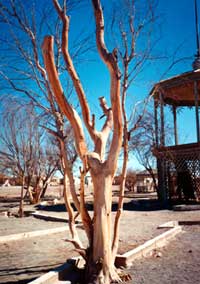|

Sculpted
tree trunk in Chacabuco, northern Chile. Artist: an anonymous
political prisoner.
Photo Copyright © Joanne Pottlitzer. 1995
|
I left
Chile one month after the coup and returned for a visit the first
time in January of 1981, a very bad time, a very repressive time.
I felt I had to come back to Chile, one, to sort of smell it. And
to interview people who knew Victor before I did. I was taken to
small, clandestine places that were supposed to be the local football
club, or something, where there were peñas [small clubs,
popular since the mid-sixties, where musicians played, usually music
from the New Chilean Song movement, and where wine and empanadas
were served] going on with lots of young people singing. That was
one way people had of keeping things alive, keeping spirits up.
It preserved a sense of identity, keeping the strings of memory
alive.
I came back to stay just after my book, Victor: An Unfinished
Song, was first published in London in 1983. [A Spanish version
was published in Spain that year; the book was republished in the
United States in 1984 under the title, An Unfinished Song: The
Life of Victor Jara, by Ticknor & Fields, New York; a new
edition will be published in London in September 2001]. I took a
plane from Australia, where I was promoting the book, to Easter
Island and on to Santiago thinking that I wasn’t going to be
let in. But they did let me in. Just before Christmas of 1983. They
told me that if I didn’t take part in anything political, I
could stay; otherwise, out. So I was relatively careful. I didn’t
want to go out, for example. I did go to funerals.
There were so many funerals. They were obvious political demonstrations.
That’s what I most remember about that time. Funerals of people
who were killed for this or that. And also funerals of well-known
people like the actor Roberto Parada or Rodrigo Rojas [the young
man who was set on fire by Pinochet's henchmen]. That was where
we would meet, in the cemetery. Really. It was terrible. And of
course there were songs, along the way and in the cemetery. Running
from the tear gas and all that. Matilde [Pablo Neruda's widow].
That’s what I most remember.
ANGEL PARRA, Composer, Singer
[Angel Parra is part of a remarkable family. One of his uncles
was a poet and a troubadour, another a union leader all his life;
his uncle Nicanor Parra is a physicist and Chile’s best known
poet on an international level after Neruda; his sister Isabel is
a prominent singer and musician, as are his son Angel and his niece
Tita. His mother, Violeta Parra, is one of Chile’s true folk
heroes, a luminous musical talent as composer and lyricist who inspired
many who created the New Chilean Song movement of the 1960s and
1970s. In 1965, Angel and Isabel established a small club in the
house they had recently bought, where exponents of the New Chilean
Song came to perform: the Peña de los Parra. People went
there to listen to Victor Jara, Rolando Alarcón, Patricio
Manns, Isabel, Angel, many young musicians. Later, peñas
appeared in cities all over the country, all exact copies of the
Peña de los Parra: low tables, carafes instead of bottles
of wine, candles, with empanadas and croquettes for sale at intermission.]
|
|


